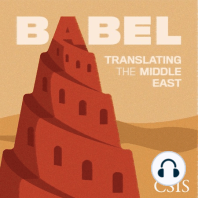29 min listen

China in the Middle East: Part Four
China in the Middle East: Part Four
ratings:
Length:
17 minutes
Released:
Feb 11, 2020
Format:
Podcast episode
Description
In the fourth episode of our podcast miniseries, China in the Middle East, Jon Alterman explores the Middle East’s perspectives on China with Mohammed Sudairi and Ariane Tabatabai. They talk about how the Middle East holds high hopes for China’s future role in the region and focus on Iran and the Gulf as examples. They also discuss the myth of Chinese workers speaking fluent Arabic and what Iranian storekeepers tell shoppers about bicycles made in China.
China in the Middle East is a six-part miniseries that is part of our regular series podcast, Babel: Translating the Middle East. We release new episodes every Tuesday.
Mohammed Sudairi, The Communist Party of China’s United Front Work in the Gulf: The “Ethnic Minority Overseas Chinese” of Saudi Arabia as a Case Study, Dirasat, March 2018.
Mohammed Sudairi, China as the New Frontier for Islamic Da‘wah: The Emergence of a Saudi China-Oriented Missionary Impulse, Journal of Arabian Studies, September 2018.
Ariane Tabatabai, The Islamic Republic’s Foreign Policy at Forty, Atlantic Council, February 8, 2019.
Ariane Tabatabai, Don’t Expect a Thaw in Iran, Foreign Policy, December 10, 2019.
China in the Middle East is a six-part miniseries that is part of our regular series podcast, Babel: Translating the Middle East. We release new episodes every Tuesday.
Mohammed Sudairi, The Communist Party of China’s United Front Work in the Gulf: The “Ethnic Minority Overseas Chinese” of Saudi Arabia as a Case Study, Dirasat, March 2018.
Mohammed Sudairi, China as the New Frontier for Islamic Da‘wah: The Emergence of a Saudi China-Oriented Missionary Impulse, Journal of Arabian Studies, September 2018.
Ariane Tabatabai, The Islamic Republic’s Foreign Policy at Forty, Atlantic Council, February 8, 2019.
Ariane Tabatabai, Don’t Expect a Thaw in Iran, Foreign Policy, December 10, 2019.
Released:
Feb 11, 2020
Format:
Podcast episode
Titles in the series (100)
Sectarianism in Lebanon: Jon and Hanin Ghaddar discuss sectarianism in Lebanon, the changing role of Hezbollah, and what’s next for a country mired in economic troubles. by Babel: Translating the Middle East